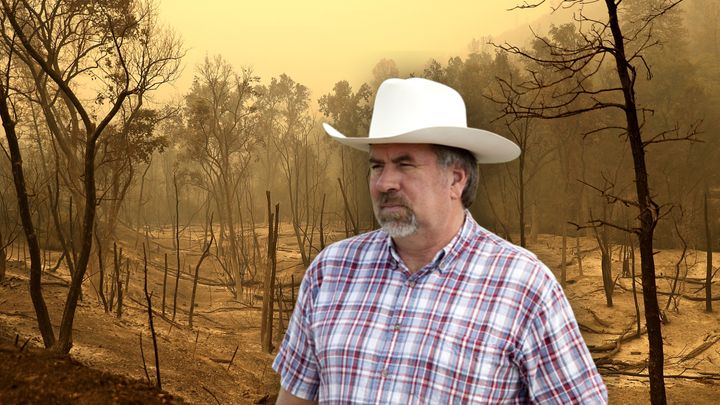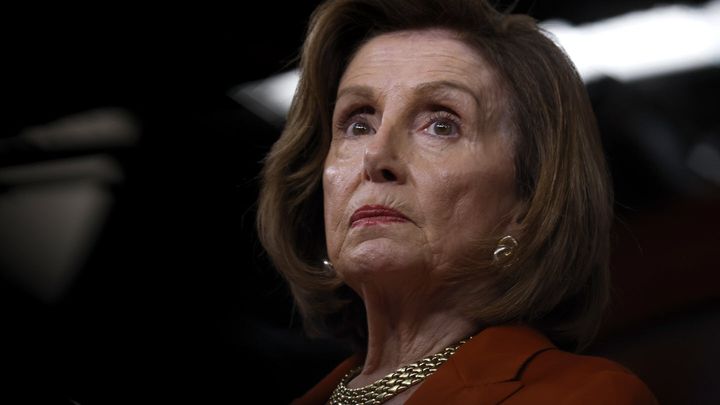A northern California Republican who is cozy with the fossil fuel and logging industries is facing another challenge from a Democrat who supports ambitious climate policy.
Audrey Denney recently announced a second campaign to oust Rep. Doug LaMalfa, who bested her by 10 percentage points last year in the race to represent California’s 1st Congressional District. The first candidate to sign the Green New Deal Pledge, Denney, an agricultural educator, scored the first 2020 endorsement by environmental activist group Sunrise Movement on April 27.
“In 2018, 93 lives were lost in my district in the Carr and Camp Fires,” said Denney in a Sunrise Movement press release. “Wildfires exacerbated by drought, climate change, and a lack of forest management threaten the lives, homes, and livelihoods of the people who live in California’s 1st District. I’m running for Congress because we need a representative who is only beholden to their constituents, not to corporate interests and political gamesmanship.”
Denney has pledged to reject campaign contributions from corporate political action committees and is a No Fossil Fuel Money pledge signer, meaning she’ll also refuse large donations from executives of oil, gas, and coal companies. This won’t affect her campaign finances much, as she received less than $2,000 from individuals and PACs in the energy and natural resources sector in the 2018 elections.
LaMalfa, on the other hand, has benefited from support from fossil fuel companies. From 2013 through 2018, LaMalfa’s campaigns received $192,156 from PACs and individuals in the energy and natural resources sector, with 84% of that total coming from PACs, according to the Center for Responsive Politics. He has received over $103,000 from PACs and individuals in the oil and gas industry.
Denney is a foil for LaMalfa, who has denied man-made climate change, as well as its role in increasing the frequency and intensity of forest fires, which roiled his district just last year, killing dozens of people.
“The congressman’s ineffectiveness given his status on the House Agriculture Subcommittee on Conservation and Forestry goes far beyond his denial of science and speaks to his failure to serve in his most basic capacity as the voice of our rural district in Washington,” Denney told Sludge. “Under his leadership, we’ve seen increased mismanagement of our forests, policy missteps between federal and state government agencies that have limited our land management strategies, and increased cuts to federal conservation and forestry funding that have crippled our rural economies and made forest health the most urgent public health crisis facing rural Californians today.”

Increasing the Chances of Forest Fires in His District?
As deadly forest fires ravaged his California district, LaMalfa, the ranking member on the Conservation and Forestry Subcommittee, sponsored legislation to open up more federal lands to the for-profit logging industry while bypassing standard environmental assessments.
Salvage logging proponents focus on the benefits of clearing brush and debris, which can spark fires, but some say disaster logging focuses on hauling out fallen trees, leaving much of the smaller, more flammable materials behind.
Chad Hanson, co-founder of conservation group the John Muir Project, previously told Sludge that his organization conducted a major study and “found that the forests with the fewest environmental protections and the most logging actually burned the most intensely.”
In 2015, Hanson and 249 other scientists sent a letter to the Senate saying that post-fire salvage logging can increase the likelihood and intensity of such fires and “set back the forest renewal process for decades.” While the research is mixed, additional studies have concluded that post-fire logging heightens fire risk.
That same year, LaMalfa co-sponsored a pro-logging bill, the Emergency Wildfire and Forest Management Act, which was supported by logging and wood products interests and opposed by environmental groups. The legislation passed the House but didn’t get a Senate vote.
LaMalfa tried again during the next session of Congress, co-sponsoring a new version of the bill called the Resilient Federal Forests Act of 2017, which requires environmental assessments of forest management activities to only consider the impact of the activity or “the alternative of no action,” opening up more federal lands for private logging and exempting large logging projects, including clearcutting, from meaningful oversight. This time, it passed the House but didn’t get a vote in the Senate. Hanson previously told Sludge that the legislation was “the most significant attack on our national forests in history. We’ve never seen anything this extreme.”
Also in 2017, LaMalfa co-sponsored the Emergency Forest Restoration Act to loosen environmental regulations on national forests. Sponsors claimed their legislation, which would open up more national forest lands to commercial logging and exempt certain areas from the National Environmental Policy Act of 1969, would protect and regenerate forests.
In 2019, LaMalfa continues his effort to expand logging and derail environmental protections. He is the primary sponsor of the CARR Act, which “exempts wildfire mitigation activities [including forest thinning] conducted within 300 feet of a road from all laws governing” environmental review and endangered species protection.
Speaking about wildfire protection to a room full of government officials and representatives of the logging, forestry, and construction industries in February, LaMalfa said, “We need to advance the force of the private sector.”
LaMalfa’s campaigns have received contributions from officials at Anderson, California-based Sierra Pacific Industries, the nation’s fourth-largest lumber producer. Mark Emmerson, the chief financial officer and a member of the billionaire family that owns the company, gave the LaMalfa campaign $500 last October, while corporate affairs director Andrea Howell donated $250 on the same day.
“Active forest and rangeland management, including harvesting, grazing, prescribed burns and other fuels treatments, would make our forests healthier, less prone to severe fires and help them adapt to a hotter, drier climate,” said Howell in 2018.
In 2012, Emmerson and his brother, George, both donated $1,000 to the LaMalfa campaign. Sierra Pacific President George Emmerson and his family are prolific donors to GOP politicians, especially those who promote logging expansion, having given over $1 million to mostly Republican federal candidates and PACs since 2015.
This year, LaMalfa’s biggest donor by far is Take Back the House PAC, a committee that supports Republican candidates and took in millions of dollars in the first quarter. On March 29, LaMalfa got $72,000 from the PAC, which had received $25,000 from Mark Emmerson one week earlier.
Oil and gas donors have given generously to Take Back the House PAC this year as well. Kelcy Warren, CEO of oil and gas transportation company Energy Transfer, gave a whopping $754,000 in February and March, and nine other Energy Transfer executives also donated, including president Mackie McCrea ($10,000), executive vice president Thomas Mason ($10,000), chief operating officer Matt Ramsey ($2,700), and chief financial officer Thomas Long ($2,000). The Energy Transfer PAC also contributed $10,000.
Energy Transfer does not own any pipelines that run through California, but its Transwestern Pipeline brings gas to Arizona’s border with California, merging with Pacific Gas & Electric’s pipeline, for distribution in the state.
Executives from California-based oil companies gave to Take Back the House PAC, including Gradele Oil ($28,000), Bestway Oilfield ($2,000), and the Independent Oil Producers’ Agency ($250). Additional oil and gas leaders contributed; John Hess, CEO of oil company Hess Corporation, gave the committee $100,000 on the same day that Emmerson made his donation.
LaMalfa’s communications director did not respond to Sludge’s request for comment.
Denney told Sludge, “We must have policies that bring diverse stakeholders to the table in order to support selective sustainable logging, to restore appropriate density to the forests, and remove excess and dead trees. A healthy and fire-safe forest requires that we support education and implementation of scientifically proven forest management strategies that provide for the diversity of species and ages of trees in the forest, reducing the chance of massive die-off from disease or pest outbreaks that exasperate our fire risks.”
The challenger said that to address forest health and climate change, solutions include “training foresters to adopt climate-friendly practices, utilizing selective sustainable logging to restore appropriate density to forest land, supporting education and implementation of proactive fire control measures, new industry utilization of woody biomass removed from public land…and increasing incentives for investments in renewable energy.”
LaMalfa’s Friends in Oil and Gas
LaMalfa is a member of the House Transportation and Infrastructure Committee and sits on the Subcommittee on Railroads, Pipelines, and Hazardous Materials, which has jurisdiction over oil and gas pipelines, and the Subcommittee on Water Resources and Environment, which oversees oil spills and other water pollution issues.
Accordingly, from 2013 through 2018, LaMalfa’s campaigns took in significant amounts from the PACs of oil and gas companies and utilities that burn or deliver fossil fuels. For example, he has received $11,000 from the Occidental Petroleum PAC, $7,500 from Exxon Mobil’s PAC, and $6,500 from Chevron’s PAC. In addition to other petroleum trade groups such as the American Petroleum Institute and the American Gas Association, the California Independent Petroleum Association has given his campaigns $1,000.
From the PAC of California-based Pacific Gas and Electric utility, he has received over $21,000, and he’s gotten $6,000 from the PAC of California-based Edison International, a utility holding company based in California, and $3,000 from California-based Sempra Energy.
So far in 2019, LaMalfa’s campaign has gotten over $3,100 from Warren of Energy Transfer, which owns oil company Sunoco; close to $1,000 from John Hess; and over $3,500 from Magnolia Oil and Gas CEO Stephen Chazen, according to a Sludge review of a first-quarter Federal Election Commission report.
Denney was critical of LaMalfa’s extensive corporate funding.
“The people who live in my district deserve a representative that only works for them,” she said. “I have pledged not to take money from any corporate PACs—including fossil fuel PACs —because I will only answer to the people in my district. How can we expect our leaders to take bold action to protect citizens when their re-election depends on checks from fossil fuel, pharmaceutical, and telecom company PACs?”
LaMalfa has displayed his interest in the oil and gas industry in other ways besides campaign fundraising. In 2017, he sent a natural resources legislative assistant on a tour of Texas oil and gas facilities sponsored by the American Exploration and Production Council and oil and gas private equity firm Enervest.
The California congressman may have a personal financial stake in climate change denial. According to his 2017 financial disclosure, LaMalfa owns partial stakes worth between $1.1 million and $5.25 million in a rice farm and a rice drying facility, LaMalfa Farms, Inc. Rice farms that are intermittently flooded can produce huge amounts of greenhouse gas nitrous oxide, while continuously flooded rice farms emit methane, another greenhouse gas.
As of December 2017, LaMalfa was the “highest earner of farm subsidies in Congress,” according to the Chico Enterprise-Recorder, a Chico, California, local paper. His spokesperson told the outlet that LaMalfa had “voted to end direct farm subsidy payments in the very first farm bill he worked on.”
“Science has proven that our changing climate is the driver behind forest fire regularity and intensity, and no one knows that better than California’s First Congressional District,” said Denney. “We must take a bold and aggressive approach to combating the effects of climate change.”



